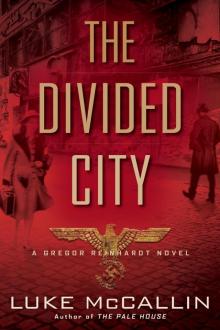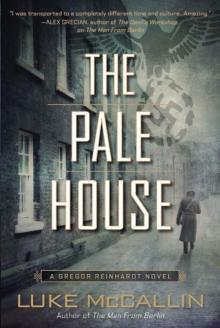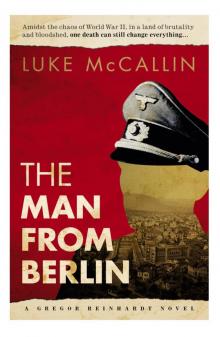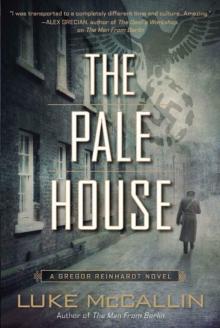- Home
- Luke McCallin
The Pale House (A Gregor Reinhardt Novel) Page 10
The Pale House (A Gregor Reinhardt Novel) Read online
Page 10
He wiped his light slowly across the room. In one of the corners, the bare stone of the walls was mottled dark with overlapping spatters, like handfuls of paint thrown upon the stones. Squinting closer, he counted five such clusters, and the ground was fouled and scuffed beneath them.
“Five bodies,” he murmured to himself as he swung his light back. “Five sets of clothes belonging to someone else. Ligature marks. Gunshot wounds. Disfigurement.”
“A real riddle, sir.” Reinhardt turned quickly in surprise. He had not heard the stairs creak as Benfeld came back down them. “We have visitors upstairs. Feldgendarmerie. New ones. From a penal battalion. Say they have jurisdiction here, as their men are working on this construction site. And the Ustaše have shown up, with a policeman in tow. Lainer’s keeping them back for now.”
“Who would be missing five men, Lieutenant? Or put it another way, who would need to hide the identities of five men?”
Benfeld pursed his lips as he shook a cigarette from a packet. He shrugged, a tight little movement. He looked very tense, his arms close to his side. He swung his cigarette up to his mouth, his forearm swiveling close to his body, and drew hard on it. The red glow spread across his face, so much gentler than the yellow glow of the flashlight.
“What do you need, sir?”
“Give me one of those, for a start,” said Reinhardt, tucking his flashlight under his arm as he lit a cigarette from Benfeld’s. “Then get these bodies out of here. I want them taken down to the military hospital. You take care of it. Go with them, and find a doctor. I want the bodies examined, and then autopsied.”
“Autopsied? Yes, sir.”
“Any news on my lights?”
“None. I wouldn’t hold your hopes up for it, either.”
“What I wouldn’t give for a camera and some photos,” Reinhardt muttered to himself, angry when he realized his tongue was stroking that gap in his teeth. He walked over to the bodies, taking one last look at them, at the way they lay. “A penal battalion, did you say?” he asked Benfeld, turning suddenly. The lieutenant nodded, a small, tight movement. Reinhardt’s mouth pursed, and then he followed Benfeld up the stairs and out into the chill air. Outside the house he stopped, checked by that smell, that rotten-egg stench. He followed it up the side of the house, his flashlight’s beam breaking over rubble and stone, a wall that tumbled down into the dark. The smell was stronger back here as he peered into the neighboring house, which had collapsed into itself. A strong sulfuric reek, and something else. The smell of burned wood and stone, and beneath it all, a furtive layer, like charred meat. He had smelled this before, in Belgrade, and in Vienna, after an air raid.
He climbed carefully up over a slew of rubble, moving his flashlight slowly until the light settled on a swath of blackened rock and stone, and nestled at the bottom of it, a twisted cylinder of metal, bent and rippled by some extreme heat. Reinhardt leaned, putting his hand close to it, feeling the echo of residual warmth, wondering if there were any more of them out there, and remembering this place had been bombed not so long ago.
“There,” he said to Benfeld, who had followed him out. “That’s what’s left of an incendiary flare. The Allies drop them during their raids to mark their targets for them. I’m guessing the killers must have triggered it by mistake, and that was the light and noise that woke the neighbors and brought the Feldjaeger up here.” He stepped back down the spill, his feet clacking softly on loose stone. “Tell everyone to be careful. There could be all kinds of unexploded ordnance still lying around.”
Back down the street, his foot kicked a shell casing that went ringing off into the dark, to where the checkpoint had been set up, and where flashlights and headlights made a confusion of shapes, angled shadows and pools of darkness. Lainer called to him, backlit by a car’s lights.
“Reinhardt, over here!” Several men stood with him, a pair of Feldgendarmes—one of them Major Neuffer, the liaison officer with the Feldgendarmerie—and an Ustaša. A fourth man, standing somewhat back from the others, was dressed in a rumpled suit and overcoat. “Reinhardt, you remember Major Neuffer. And this is Lieutenant Brandt, from the 999th Balkans Field Punishment Battalion. It seems we’re in his way.” The lieutenant was a thin man, his gorget hanging from a scrawny neck. The red triangle of a penal unit was stitched to the arm of his coat. He seemed familiar.
“Come now, Captain,” said Neuffer. “He didn’t state it in quite those terms. A nasty business, it seems, eh, Reinhardt?”
“What do you want, Neuffer?”
There was a pause, as if Neuffer had been put out by Reinhardt’s forthrightness. “It’s not so much what I want, Captain,” he said, emphasizing the rank ever so slightly. “It’s what others want, and need. Lieutenant Brandt has a job to do. And this is Captain , Ustaše liaison to the army, and Inspector of the Sarajevo police. They also have a job to do.”
“What might those be?”
“I have an anti-aircraft installation to complete, Captain Reinhardt,” said Brandt. Reinhardt cocked his head, slightly, looking at him, realizing he had seen him the day before. At the Ustaše checkpoint, in the car with the Feldgendarme major.
“It’s a bit early in the morning for construction work, isn’t it?”
None of the Feldgendarmes replied to that, but stepped forward. “Captain, you have bodies up there? Then, respectfully, I put it to you that this is the job of the police to investigate,” he said, indicating , a thin man with only a frizz of hair that ran over his ears and around the back of his white head. The inspector kept his eyes level, but Reinhardt could see the man’s discomfort. He was a civilian, a Muslim by his name, caught between the sharp edges of jurisdiction, between what might be right, and what might be acceptable. Once, Reinhardt might have felt sorry for him. Once, Reinhardt had been him, but that was a long time ago. He felt a sudden light-headedness, a vertigo tilt as if he looked down on this and could not take the air at such a rarefied height. He took a deep breath, calmed himself, and realized the feeling for what it was. Power. The raw exercise of it. That he and Lainer—and Benfeld, for that matter—had the mastery of this situation. Not because they were more fit for it but because of who they were.
“I think not, Captain .”
“And why would that be?” barked Neuffer. He seemed to pull himself together, rising up to his inconsiderable height, his chin bunching up tight. The Kaiser, Reinhardt thought, puffing himself up in front of his men. “Why exclude the police from this?”
“I have two dead Feldjaeger, a third wounded. I have reason to believe their deaths are linked to the others. Therefore, it is one case, and it’s mine, until such a time as my colonel says otherwise.”
“This kind of unreasonableness is precisely what I was afraid of, and what I was warned about,” complained Neuffer.
“Someone’s been doing an awful lot of forewarning about me, Major. Care to enlighten me?” Neuffer said nothing, visibly simmering. “Then let me tell you, the first minutes and hours after a crime has been committed are the most important. I will not have this crime scene corrupted if I can avoid it.”
snorted. “Oh, come now, Captain. It’s quite obvious what’s happened. It’s the Partisans.”
“Yes.” Neuffer leaped into the narrow breach afforded by the Ustaša. “The Partisans. It would be just like them.”
“And you wonder why I want to keep some level of control over this?” and Neuffer looked confused. “You’ve seen nothing. Examined nothing. And yet already you are jumping to conclusions. However,” said Reinhardt, switching tacks, hoping to keep them off-balance, “I admit a little help would not go amiss and I’m willing to cooperate. My lieutenant here can show Inspector the bodies before we move them to the military hospital for autopsy. He’s—”
“The military hospital, Captain?” interrupted. “Why, may I ask?”
“I want a military doctor to examine them.”
“I will get to that part shortly. As I was saying, the inspector is welcome to share in the results of the autopsy, and I need help in questioning the locals. There’s a few of them, and they must’ve heard something.”
“Indeed. Sharing of information, it’s the best way forward,” added a relieved-sounding Neuffer. Such a formulaic little man, Reinhardt thought, again.
“That is most reasonable of you,” said . “The inspector will view the bodies. I will take care of talking with—”
“Thank you, Captain, but I would rather the inspector take care of that as well.” Not that Reinhardt was under any illusions that whatever learned he would not pass on to the Ustaše. He would. It was how men like him survived day to day.
“Captain, are you suggesting anything?” That from Neuffer again.
“Suggesting nothing, Major. I just don’t see the need for Ustaše involvement.”
“And why not, Captain?”
“General Herzog said our involvement ends where the field gray ends. Well, those Feldjaeger wore field gray. Everything else follows from that. It’s ours and I see no need for the Ustaše.”
“It is all right, Major Neuffer,” said . “I can understand the captain’s thinking.” The Ustaše began giving orders to a desperately uncomfortable-looking . Reinhardt had no great faith in the ability of the inspector to elicit anything worthwhile from the locals, but they would at least survive interrogation by him. Having the Ustaše do it was an uncertainty he could not countenance.
“And what of me, Captain?” interjected Brandt. “I’ve got fifty men waiting for work, and a timetable to keep.”
“It’ll keep, Lieutenant,” snarled Lainer. “It’s only earth. It’s not going anywhere.”
“Sir . . .” began the Feldgendarme lieutenant.
“Your bloody convicts’ll just have to wait until we’re done.” The big Feldjaeger was a formidable sight in anger, and he was angry now. “Right now, fuck the hell off out of here.”
“Captain,” protested Neuffer, although he too seemed taken aback by Lainer’s anger. “There’s no need for such a tone.” There was a stiff movement to one side—Benfeld, taking a step backward.
“You think?” spat Lainer.
“Gentlemen, I just need a little patience from you all. Then Lieutenant Brandt will be able to go ahead with his work. Lieutenant Benfeld, will you escort the inspector?”
With that, the group broke apart, and Reinhardt watched Benfeld and walk up the hill, their silhouettes blurred against the yellow glow of their flashlights. Reinhardt walked away from the tangle of vehicles and the competing demands of men and their factions, needing a moment to himself. He lit a cigarette, pausing around a deep lungful of smoke, trying to feel the way ahead from now on, his mind playing with those pieces of the puzzle he had been dealt.
The trucks from the penal battalion were drawn up to the side of the street. The backs of men mounded the canvas sides of their load beds, there was a low mutter of voices, and he realized he had seen those trucks yesterday, stopped in front of the Ustaše checkpoint.
“Kreuz? Kreuz? Are you bloody wandering about, again?”
A shape was coming up the street, flashlight stabbing the darkness between the trucks. The light tilted around, blinding him.
“Ah, sorry, Captain.” The shape resolved into a Feldgendarme sergeant, a red triangle patch sewn on his sleeve. “Like keeping track of a flock of chickens with this lot.”
“There’s no one here, Sergeant.”
“Right, sir. With your permission?”
“Carry on, Sergeant.”
Reinhardt continued his slow walk into the darkness, his mind still tilted around that realization of the power he wielded, and the fear he had always felt inside whenever he came anywhere near anything like it. Once, long ago, he had known something similar, reveled in the respect and fear a stormtrooper’s reputation afforded him, but he had left that man behind, and had never wanted to be him again.
Just for a moment, he felt something deep inside, a sudden serpentlike coiling. As if something old and hoary had turned over, giving him a glimpse of a darker nature, mud-smeared and with the mad rolling eye of an animal gone wild. He shivered, conscious of himself in a way he had not been for a long time. He turned back up toward the lights, and for the first time in a long time his thoughts bent into the future, alert and alive, like a hound that had caught an elusive scent, and a feeling coursing through him that the hunt was afoot.
Standing on Street outside the hospital under a low, overcast sky, Reinhardt took a last pull on his cigarette, then flicked the butt away. He pushed the smoke out, washing his tongue around his mouth and wishing for something to drink. The night had been very long, and he had gotten no sleep. The dim morning light illuminated nothing, least of all the confused jumble in his mind. He took a last, long breath of cold air and walked up the steps, past a cluster of medical orderlies and nurses all smoking under the entrance’s portico. From the snatches of conversation he heard before it all died away at his approach, they were locals. Most of them averted their eyes, but one of them looked hard at him before looking suddenly away as Reinhardt pushed open the wooden doors, their squeak and squeal following him into the hospital’s lobby, where he slowed, thinking of those orderlies, the way that one who had looked back seemed suddenly familiar. Something in the way he had been standing, in the set of his eyes. He was about to go back outside when he saw Benfeld waiting for him, the Feldjaeger leaning back against the wall with his arms folded and eyes closed. As Reinhardt hesitated, Benfeld’s eyes slit open, then widened as he straightened.
“What do you have, then, Frenchie?” Reinhardt asked, still of two minds about going back outside to find that orderly.
“The bodies got here, all right. Finding a doctor was something else. I had to swing some weight to get done what you wanted done,” he said, stifling a yawn, and murmuring an apology as he did so. He indicated an orderly waiting nearby. “He’ll take us to the doctor. How did it go up there after I left?”
“About as confusing as I thought it might.” , the inspector, had taken a look at the bodies in the basement, made no notes, asked no questions, and had then left the house to conduct a series of halfhearted interviews with the people living in and around the street. Between the inspector’s German, which was poor, and Reinhardt’s stumbling Serbo-Croat, they had made slow headway. No one really wanted to talk, which Reinhardt could understand, but not accept. Toward the end the interviews had resembled interrogations, with shouting and Reinhardt pushing and prodding, but all it had elicited them was a confused picture of a quiet night shattered by gunfire, then more silence. Some had said they heard a car, others a truck. Some said the killers spoke German, others were not sure. From most they got tears or protestations or just dumb insolence. The one thing they got from all of them was fear. They were frightened of Reinhardt, of his uniform, but they were more scared of and the threat that lurked in his shadow, the fear of the Ustaše. That, above all.
At the end of it all, pooling what information they had, they had constructed a rough timeline of what had happened. At around three in the morning, everyone had been woken by a muffled explosion. Some had said it was more of a hissing sound. Witnesses had reported a bright light and the sounds of men cursing, which must have been the incendiary flare the killers had accidentally triggered. Then silence. Like good survivors, they had all hidden, hoping for whatever storm it was to pass over. Most had stayed hidden, but one person said she had heard the Feldjaeger’s vehicle climbing the street, reporting quite accurately the sound a kubelwagen’s engine made in low gear. Then there was gunfire, a lot of it, and a handful of people had heard hurried footsteps. There had been voices, most agreed, but no one could or would agree on what had been said, nor even what language. Shortly after the gunshots, another
vehicle had driven away.
“Nothing more than we could have guessed for ourselves, really,” Reinhardt said, summing it up. “Shall we?” he asked, pointing to the orderly, still thinking that one of those who had been standing outside had seemed familiar to him. Benfeld nodded and the orderly crushed his cigarette under his heel and muttered, “Follow me.” He led them into a maze of corridors, Reinhardt feeling, remembering, how much he hated hospitals. The sight and smell of them, the way they seemed to be eerily quiet, or shatteringly noisy, never anything in between. This one was noisy. Shouts and calls, a clatter of doors, and somewhere, someone was screaming as the orderly led them down several flights of stairs into the basements. The air became cooler, the sounds of their footsteps echoing back hard from the bare concrete walls and running ahead of them like heralds.
The orderly indicated a door, muttered, “Wait in there, please,” and was gone. Opening the door onto a gust of cold air, Reinhardt saw it was a morgue, and one in much demand. A row of steel cabinets squared the wall on one side, but bodies were stacked on the floor and on tables around the room. Reinhardt spotted the five bodies from the house, one on a dissection table, the other four laid out close together on the floor, all naked.
“They haven’t been autopsied? Why not?”
“Sir, it was all I could do to get a doctor to look at them. Anything more . . .” Benfeld shook his head, his lips tightening up. “You may have better luck than me.”
Despite the cold, there was a faint miasma in the air, of rot crossed with something chemical, and Reinhardt and Benfeld both lit cigarettes at the same time. They looked at each other self-consciously a moment, and then Benfeld gave a sheepish grin. Reinhardt smiled back, shifting his weight onto his right leg. His left knee was very sore, a night spent running around having done it no favors.

 The Divided City
The Divided City The Pale House
The Pale House The Man from Berlin
The Man from Berlin The Pale House (A Gregor Reinhardt Novel)
The Pale House (A Gregor Reinhardt Novel)